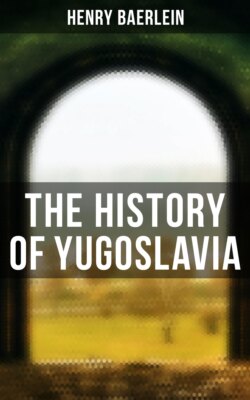Читать книгу The History of Yugoslavia - Henry Baerlein - Страница 76
На сайте Литреса книга снята с продажи.
WHAT THE CZECHS ARE DOING TO-DAY
ОглавлениеThe twenty-three priests of the Zagreb diocese who were in favour of a married clergy and of several other reforms could not stand up against their ecclesiastical superiors. The movement has made no open progress and their leader has been constrained to abandon Holy Orders and become a timber merchant. Nevertheless the idea of a national Church has not vanished; a good deal depends for other countries on the degree of success which attends the newly established national Church in Czecho-Slovakia. It already possesses over half a million adherents out of a population of 13 millions. We may be going to witness the rise of a series of national Churches, a consummation which—a Roman Catholic might observe—will very likely be no more successful in bringing nearer the brotherhood of man than the wide-flung Catholic Church. The enthusiastic nationalism of such new Churches may, in fact, help to postpone that happy state of things. In any case, and whatever be the results, we shall do well not to ignore the beginnings of what may be a mighty Reformation.
Ever since 1848 the Czech clergy have been anxious to obtain reforms, not so much in dogma as in discipline. They assert that it is more in accordance with the democratic spirit of the age if a priest is selected not by some magnate but by his prospective parishioners; they desire to have their mother-tongue employed for the liturgy—in this respect they are in advance of most Catholic countries—and they wish to allow their priests to marry or not to marry, as each man prefers. This, one need hardly say, is the point which, almost to the exclusion of all others, is taken up by the hostile compatriots of the new believers. "It is nothing more nor less than this," said a portly Benedictine abbot to me one day in Prague, "there are priests who live in concubinage and they actually want to have it legalized!" But in Czecho-Slovakia, with her vivid memories of the Hussites in the fifteenth century—magnificent new monuments to John Huss decorate the principal towns—in Czecho-Slovakia the old régime has not the same power as in Croatia. At first the new Church was sneered at, being called a Churchlet, then they called it a sect, and now they say it may persist for fifty years. While its critics occupy themselves so largely with the topic of clerical celibacy, the founders of the Church themselves are much more interested in other questions. They do not greatly concern themselves with their priests' apparel, holding that this need not trouble them more than a little, since they are striving for something more weighty—the freedom of conscience. In this, as they say, they are carrying on the doctrines of Huss, which were so bloodily repressed by the dominant party. Under Charles IV. the Roman Catholic Church possessed about one-third of all the land in Bohemia, while in Prague alone there were some three thousand priests. And if the doctrines of Huss had not sunk deeply into the minds of the Bohemians this new Church would have found her task very much more difficult. The first three bishops were ordained last year by the Serbian Bishop of Niš. It was at one time thought that the Orthodox religion would be adopted, but this was found to be impossible, and after a year of negotiations it was settled that the Serbian Church should be regarded as a sister Church.
The significance of Czecho-Slovakia's new Church is to be found in the national idea. So much is it a thing of the people and not of the priests that several schoolmasters have had to be ordained, the clergy being otherwise too scanty. In June 1919 a delegation from 3000 dissatisfied priests went to Rome. The Pope rejected what he called their foolish novelties. In January 1920 a secret meeting of 200 priests was held in Prague and 144 of them declared themselves for a new national Church. But few of them possessed the necessary resolution, such as was displayed by Dr. Farsky, a very intelligent and earnest young man who was Professor of Religion in the University and has now been appointed the Head of this new Church, as Bishop of Prague and Patriarch. His opponent, the Roman Catholic Archbishop of Prague, has the reputation of being one of the cleverest of Czech politicians, and it will be interesting to see how the position develops. Since the War the Roman Catholic Church has lost 25 per cent. of its members—during the War it was, in the opinion of many, though perhaps it had no option, very much the servant of the Habsburgs. And one imagines that the Archbishop is handicapped by the demands of his party that the State should unquestionably continue to pay the yearly interests of the large number of monasteries that were dissolved more than a century ago by Joseph II. "All England's troubles," said the Coadjutor-Archbishop to me, "emanate from the fact that she nowadays pays nothing to the Church for those monasteries that were suppressed by Henry VIII." It is doubtful whether the Czechs, exulting in their regained liberty, will for the most part take the side of Rome when the matter has been fully ventilated and discussed. "We are not monarchist at all," said the Abbot Zavoral, "we are true to the Republic, we are democratic. And discussion is democratic, but," said he, "it should not be unlimited."
